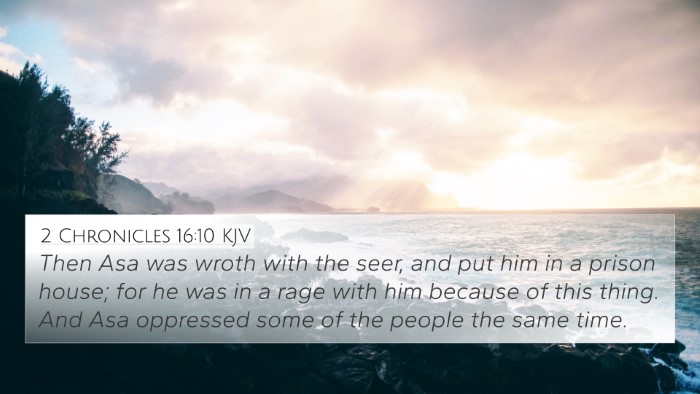Understanding Jeremiah 26:21
Jeremiah 26:21 states: "And when Jehoiakim the king, with all his mighty men, and all the princes, heard his words, the king sought to put him to death: but when Ahikam the son of Shaphan was withstood by the people." This verse reveals the tension between the prophetic message delivered by Jeremiah and the response of the political authorities at that time.
Contextual Background
In the context of Israel's history, Jeremiah was a prophet during a tumultuous period leading up to the Babylonian exile. His prophecies often delivered uncomfortable truths about the people's sinful ways and the impending judgment from God. This led to significant conflict with the ruling powers.
Commentary Insights
-
Matthew Henry's Commentary: Henry notes that Jeremiah's bold proclamation was met with hostility, illustrating the common theme of divine messengers facing rejection. He emphasizes that Ahikam's intervention was crucial in averting Jeremiah's execution, showcasing the providence of God even amid opposition.
-
Albert Barnes' Notes on the Bible: Barnes highlights the political ramifications of Jeremiah's message, particularly the fear of Jehoiakim, who recognized the threat posed by the prophet's words. This fear stemmed from a desire to maintain power and control, reflecting the heart of many leaders who resist prophetic truth.
-
Adam Clarke's Commentary: Clarke elaborates on Ahikam’s protective role, suggesting that he acted in accordance with God’s purposes. He posits that the profound impact of a single individual can influence the course of events significantly, reminding readers of God’s use of people for his will.
Thematic Connections
This verse connects to broader themes of resistance to prophetic authority, the role of leadership in the acceptance or rejection of divine messages, and God’s sovereignty in protecting His prophets. The tension illustrated here resonates throughout both the Old and New Testaments, emphasizing the necessity of discernment in understanding God's voice.
Cross References
This verse is richly connected to numerous other biblical texts that explore similar themes. Below are some relevant cross-references:
- Jeremiah 7:25-26 - Highlights the persistent disobedience of the people despite receiving countless prophets.
- Jeremiah 20:1-2 - Details the imprisonment of Jeremiah, showing the consequences of his prophecies.
- Luke 4:24 - "No prophet is accepted in his own town," illustrating the universal rejection of prophets.
- Matthew 23:37 - Jesus laments over Jerusalem, paralleling the rejection faced by prophets like Jeremiah.
- Acts 7:51-53 - Stephen calls out the Israelites for resisting the Holy Spirit, echoing similar sentiments found in Jeremiah.
- 1 Kings 18:17-18 - The conflict between Elijah and King Ahab representing a similar dynamic of prophetic confrontation.
- Ezekiel 2:4-7 - God's commission to Ezekiel mirrors Jeremiah’s calling and the anticipated rejection from the people.
How to Use Bible Cross-References
Understanding the connections between scriptures can provide deeper insights into the biblical narrative and its application in life today. Here are some tools to consider for cross-referencing:
- Utilize a Bible concordance to find related verses categorized by keywords.
- Employ a Bible cross-reference guide during study to trace thematic links between passages.
- Integrate software or apps designed for Bible cross-reference systems that can provide instantaneous connections.
- Participate in cross-reference Bible study methods to enhance group discussions and understanding of scripture.
- Leverage Bible reference resources available in print or digital formats to explore comprehensive connections.
Encouragement for Study
As one delves into the prophetic literature of the Old Testament, it is crucial to observe how these texts interact with the teachings of the New Testament. Each cross-reference brings forth a richer understanding and encourages believers to recognize the continuity of God's message through time.
Conclusion
Jeremiah 26:21 serves as a poignant reminder of the struggle between divine truth and human authority. By employing tools for cross-referencing, believers can uncover profound insights, enhance their scriptural knowledge, and ultimately encourage others through the powerful lessons embedded in biblical texts.













